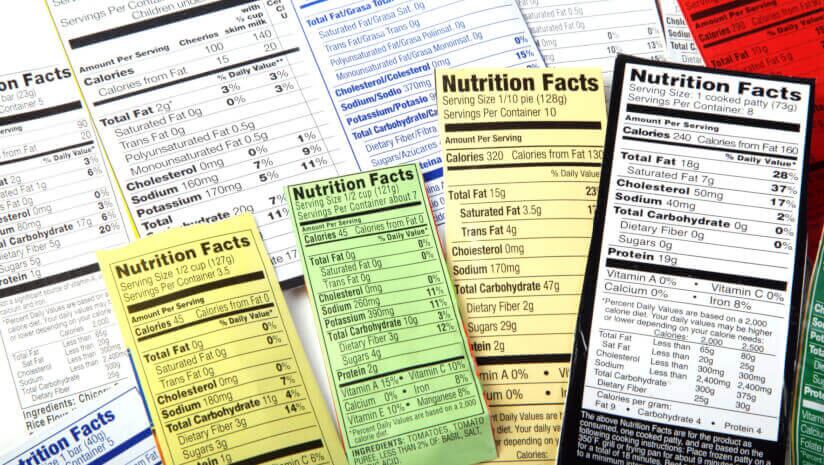
FDA issues final rule on ‘healthy’ claim, updates requirements
FDA changes “healthy” claim requirements based on current science
News & Analysis on Food & Beverage Development & Technology

FDA changes “healthy” claim requirements based on current science

Animal protein stakeholders responded to the Dietary Guidelines, affirming the need for more of the macronutrient in American diets

FDA’s updated guidance on genome-edited plants adds an additional layer of flexibility for industry stakeholders, while upholding the agency’s 1992 safety policy.

A US lawsuit alleges major food companies engineer UPFs to make them as addictive as possible to consumers, especially children.

Albertsons is terminating its controversial merger agreement with Kroger and suing its former bedfellow for breach of contract and failing to take “any and all actions” to secure regulatory approval of the duo’s previously planned union.

Dietary Guidelines Advisory Committee
Dietary Guidelines Advisory Committee stops short on offering guidance for ultra-processed foods but for the first time calls on regulators to factor in race, culture and socioeconomic status in nutrition guidelines in its highly anticipated final report...

FDA could strengthen labeling requirements for plant- and cell-based products to ensure consumers understand how their nutrition and production compare to that of their animal-based counterparts, agency officials told legislators last week.

Soup-To-Nuts Podcast
FDA is under pressure to require standardized science-based, front-of-pack labeling to help consumers interpret nutrition information on food products – but what will the mandate mean for packaged food brands?

Post-market assessment of chemicals in food is a ‘huge priority’ for FDA’s recently created Human Foods Program, top agency officials told skeptical senators this week.

The draft document contains information on how manufacturers must notify the regulator in a bid to improve supply chain resiliency

Confusion about whether food is safe to eat after “sell by,” “use by” and “best by” dates accounts for an estimated 20% of food wasted in the home, according to FDA, which is why the agency and USDA are considering whether and how to standardize date labels.

How, and why, do microplastics alter the microbiome?

Robert F. Kennedy Jr’s nomination by President-elect Donald Trump as head of US health policy signals a shakeup in food regulations. Can bakery and snack producers adapt to his ambitious, controversial agenda?

FDA is extending the comment period for its proposed systematic process for post-market assessment of chemicals in foods, which it laid out in late September to mixed reviews from industry stakeholders who lauded its science-based and data-driven...

FDA’s request this week for information on per- and polyfluoroalkyl substances (PFAS) in seafood is part of the agency’s investigation into the potential health impact of PFAS exposures, which may be higher in seafood according to sample data.

Rising credit card “swipe” fees are driving up prices and squeezing grocery and other retailers’ already slim margins, but “it does not have to be this way,” according to trade groups, companies and members of Congress who made an 11th hour push...

Dietary supplement trade associations have responded to President-elect Trump’s nomination of Robert F. Kennedy Jr. as Secretary of the Department of Health and Human Services.

Donald Trump’s electoral win as the 47th US President is already being felt across the food and beverage industry, as various trade groups and non-profits share their hopes for a collaborative next four years while other raise concerns about what the new...

Mood food for mental wellbeing – How can industry capitalize?
Brands marketing foods and ingredients for mood management must navigate a complex regulatory landscape by understanding functional claims, relying on strong scientific evidence and staying informed on emerging trends to market their products effectively...

Soup-To-Nuts Podcast
A broadly-supported new definition for “pasture-raised” poultry proposed by USDA this fall could help level the playing field for small, independent farms and brands competing in the increasingly important, crowded and confusing humanely-raised chicken...

The dietary supplement industry continues to closely monitor the evolution of tariff policies between China and the United States, pending the outcome of the U.S. presidential election.

FDA is giving the food and beverage industry an additional two months to respond to its request that they slash sodium in their products over the next three years to help Americans reduce their risk of diseases associated with overconsumption of the...

FDA’s fiscal year 2025 priority deliverables for the Human Foods Program emphasize transparency and accountability amid state funding cuts and resource constraints.

The FDA’s recent decision to remove 23 phthalates from food-contact uses while conducting safety assessments on remaining compounds has sparked both industry support for targeted regulation and advocacy calls for a total ban.

Plant-based diets remain popular, but associations with UPF and low-quality ingredients has shaken consumer trust in alt meat, fish and dairy brands. So, what can the sector do to restore public opinion?

Some nutritious foods under the current NOVA system could be demonised alongside unhealthy variants. Industry's calling for reform, but what would the next generation look like?

Dietary Guidelines Advisory Committee
Diets that exclude foods high in added sugar and saturated fat, like sugary drinks, snacks and processed meat, still provide sufficient levels of essential nutrients, like vitamins, minerals and fiber, according to the Dietary Guidelines Advisory Committee.

Dairy innovation and trends
The dairy case is no longer a limited selection of fat-free, low-fat or whole milk in generic white bottles or a bare-bones choice between just “orange” or “white” cheese – rather an explosion of innovation in recent years has dramatically multiplied...

Soup-To-Nuts Podcast
Research and advocates for 100% grass-fed dairy suggest the practice is better for people, the planet and animals – but is it better for business?

Dietary Guidelines for Americans
The Dietary Guidelines Advisory Committee (DGAC) recommended introducing a variety of fruits, vegetables and grains at appropriate ages does not adversely impact growth or increase obesity risk in young children.

Dietary Guidelines Advisory Committee
The 2025 Dietary Guidelines Advisory Committee (DGAC) recommends consolidating various dietary patterns into a single, inclusive Healthy US-Style Dietary Pattern that includes nutrient-dense, plant-based foods and which is accessible for all Americans.

Size matters – at least when it comes to crafting nutrient content and health claims for food based on servings, according to a recent BBB National Programs’ National Advertising Division decision for a challenge brought by Olé Mexican Foods against...

Food industry players across the value chain are frustrated by lingering questions about how to implement sweeping food safety changes that go into effect in little over a year, including fears of some stakeholders “going berserk” with new technology or...

USDA’s emergency Supplemental Nutrition Assistance Program (D-SNAP) benefits are available for eligible households impacted by Tropical Storm Helene in parts of Georgia, North Carolina and Tennessee, with industry associations collaborating to ensure...

2024 US presidential election
Donald Trump's election as the 47th US president signals a sea change in economic and trade policies from the Biden Administration, as the president-elect is expected to raise tariffs, which can kick start inflation again and complicate stressed supply...

The FDA's phase two draft guidance on sodium reduction, released on August 15, sets new voluntary targets for food manufacturers to reduce average consumption to 2,750 milligrams per day by 2024, as nearly three-quarters of Americans' sodium intake...

Although the Dietary Guidelines Advisory Committee (DGAC) did not find strong evidence between dietary patterns and disease risk, some age-related cognitive health issues and breast cancer are moderately linked to diet.

The Association of Meat, Poultry & Seafood Innovation (AMPS), a non-profit organization representing the cell-cultured industry, expressed its support for cultivated meat producer UPSIDE Foods and non-profit Institute for Justice on the lawsuit filed...

Letters sent by Senator Elizabeth Warren (D-Mass.) and Representative Madeleine Dean (D-Penn.) to the CEOs of Coca-Cola, General Mills and PepsiCo express concern over pricing and tax practices that, according to the policy makers, “squeeze profits out...

As the single largest reorganization in FDA’s history, the agency’s unified and modernized Human Foods Program is in effect and will “zero in” on science-based measures towards food safety and public health, according to the agency’s leadership.

USDA funding allocated for the Dairy Business Innovation Initiatives is supporting small and mid-sized dairy businesses and providing a pathway for market expansion and diversification, as the industry adopts innovative technologies around milk production

The European Commission has backtracked on European Deforestation Regulation (EUDR) implementation with a 12-month extension proposal.

The Dietary Guidelines Advisory Committee (DGAC) determined the relationships between saturated fat and cardiovascular disease (CVD) and the roles of dairy, red meat and plant-based oils with findings from last week’s meeting indicating benefits of...

Manufacturers have just over three years to reformulate packaged snacks, confections and beverages with six common – and controversial – food dyes if they want to continue selling their products in California schools.

The United States District Court of the Western District of Texas will allow to proceed a lawsuit filed by the Animal Legal Defense Fund and the Good Food Institute on behalf of Tofurky that challenges a 2023 Texas law that imposes additional labeling...

Food and beverage industry stakeholders and consumer advocates are lauding FDA’s commitment to enhance its post-market assessment of chemicals in food, but they worry the agency’s proposed process is “thin on details,” including lacking sufficient...

Removing animal-based and carbohydrate-containing products and other food groups can lead to significant nutrient deficiencies, according to the Dietary Guidelines Advisory Committee (DGAC).

The final installment of funding from the Meat and Poultry Processing Expansion Program (MPPEP) is expected to give independent US farmers and ranchers in rural communities a competitive advantage and lower grocery costs, according to USDA.

Long gone are the days when salt and pepper were sufficient seasonings for most Americans – now US consumers want bold flavors that will take their tastebuds on a global adventure, giving rise to a new class of frozen meals, sauces, spice blends and even...

Certifications and regulations put pressure on industry to conform to certain standards. But why do they occur in the first place? Consumer demand may be the key.